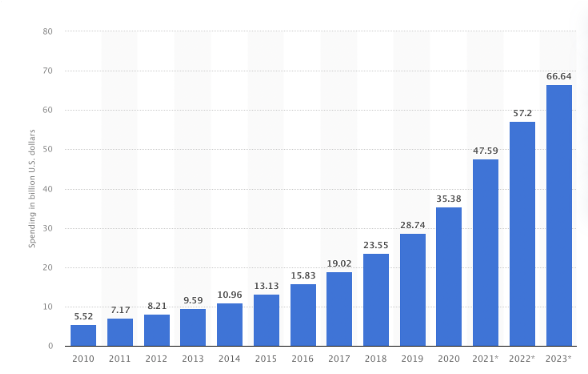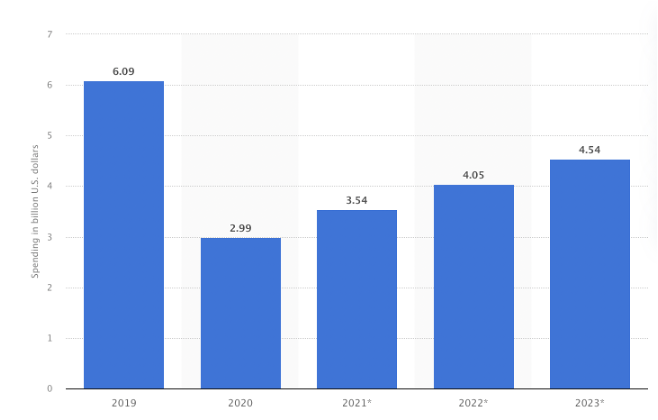The possibilities and options for your digital marketing efforts seem to grow by the month—it’s no longer enough to simply have a few email campaigns and social media ads.
With the steady influx of hot new marketing trends, B2C industries that have a lot of digital marketing money to work with are unlocking some important secrets that could inform your marketing strategy, no matter your budget.
You don’t need to spend millions on digital marketing efforts if you’re just starting out—however, there is a lot we can learn from those B2C industries that do.
Below, we dive into five industries that have the biggest annual digital marketing spend and figure out how their big budgets are driving success in the B2C realm.
B2C Industries With the Biggest Budgets
Retail
Retail is among the top spenders when it comes to digital marketing dollars. The average company in the retail industry spends 15% of its revenue on marketing every year—and 47% of that spend goes toward search engine optimization.

Studies show seven in ten retailers implement email, search engine and content marketing as a bulk of their digital marketing strategies. If you work in the retail industry, it is definitely worth leveraging these marketing tactics so you’re able to easily embrace the constant developments in technology.
Real Estate
Whether you’re an independent real estate agent or work for a corporation, the competitive real estate market makes it necessary to invest in marketing. The average company in the real estate industry spends 12% of its revenue on marketing every year—and 31% of agents are spending over $1,000 annually on digital marketing efforts.
To prove that you’re an active, successful real estate agent, you need to build a robust online presence to ensure potential customers are able to find you online—this can all start by investing your marketing dollars on a modern, responsive website and Google Business Profile management. To gain the ROI you’re looking for, make sure your website is SEO optimized to show up near the top of results when someone searches your name.
Tourism
Because there is such a low repurchase rate in tourism, businesses are forced to take marketing seriously. The average company in the tourism industry spends 15% of its revenue on marketing every year—and digital advertising accounts for 47% of all travel global ad spending.

Those in the tourism industry spend more on marketing than they do on their actual brand—this is because tourist agencies (e.g. resorts, hotel chains, etc.) have to capture their audiences’ attention before they even book a trip. When the goal of your digital marketing efforts in tourism is to make a good first impression, you’re bound to find success, fast.
Construction
To stay afloat and maintain market share, those working in construction must tap into marketing efforts. The average company in the construction industry spends 13% of its revenue on marketing every year—and 93% of construction companies expressed they would be increasing ad spend in the coming years.
A bulk of construction companies rely on word-of-mouth marketing, but when referrals begin to slow down, it becomes difficult to find new business. Once you have a defined digital marketing budget, consider implementing one or more of the following tactics that other construction companies have found success with:
- Website
- Social media
- Paid ads
- Content production (e.g. blogging)
Technology
Technology is an ever-evolving industry, which means companies in the tech space have been forced to invest a lump sum into marketing. The average company in the technology industry spends 15% of its revenue on marketing every year—and 50% of that goes toward digital marketing.
In the tech industry, marketing is one of the key drivers to growth. Between the promotion of new products to generating sales leads, it’s important to allot your digital marketing dollars appropriately to find the right tactics for you. Many tech companies find success in digital marketing efforts that are low cost, but the highest impact in terms of boosting the sales pipeline.
Big Marketing Budget Takeaways
The digital marketing budgets some of these industries have may come as a shock to many. However, the lessons we can learn from them will help shape your company’s personalized marketing strategy.
Lesson 1: If you decrease your marketing spend in any way, this can have a similar effect on your revenue.
There is a large fraction of people who believe marketing is the first effort to go when making budget cuts. While widely held, this belief if the furthest from correct.
Your digital marketing efforts set a pace for leads and revenue—it’s not just an expense on your budget with nothing to show for it. While the amount your business should allocate toward marketing will vary across industries, typically it’s going to be a percentage of your gross annual revenue.
To find the right number for your business, you will need to conduct a lot of research and testing along with close tracking and monitoring. If you’re reading this and aren’t sure where you fall, it’s recommended to just start now by increasing your marketing budget by 3% and see where that takes you.
Lesson 2: Diversify your digital marketing strategy by breaking out of the “norm.”
It’s important to stay on top of trends and what your audience members respond most to. For example, the younger generation is going to gravitate more toward influencer marketing and social media platforms like TikTok.
Although Facebook has been a leader in online advertising for the last ten years (and still is), it’s just not as effective as it used to be. Diversifying your digital marketing mix into other platforms will only benefit you in the long run. Consider testing a new platform every quarter to better understand what it has to offer and how its use aligns with your end goals.
Lesson 3: Having a unique value proposition will set you apart from any competitors.
As you read, the B2C industries with the biggest budgets are allocating at least 10% of their annual revenue to digital marketing. To ensure you at least have a spot in your target customers’ minds, you must find ways to stand out from your competition—this means putting a larger focus on your digital marketing efforts.
Making sure you have a unique value proposition (UVP) in place will give your target customers a reason to choose you. Relying on luck is a no-go— attracting new business online is a practice that favors the well-prepared.
Developing your UVP can begin with competitor research. Put yourself through the entire customer journey and take note of what you like and dislike about their online presence. Repeat the same process with your own company to find areas you can improve on to make your UVP stand out.
Let’s Start Marketing!
Once you have your digital marketing budget in place, our team of experts at Associates International can help put those efforts into motion. From developing your digital strategy to integrating a personalized campaign, our team can help you make the most of these opportunities. Contact us today to learn how we can help.
Comments are closed.

